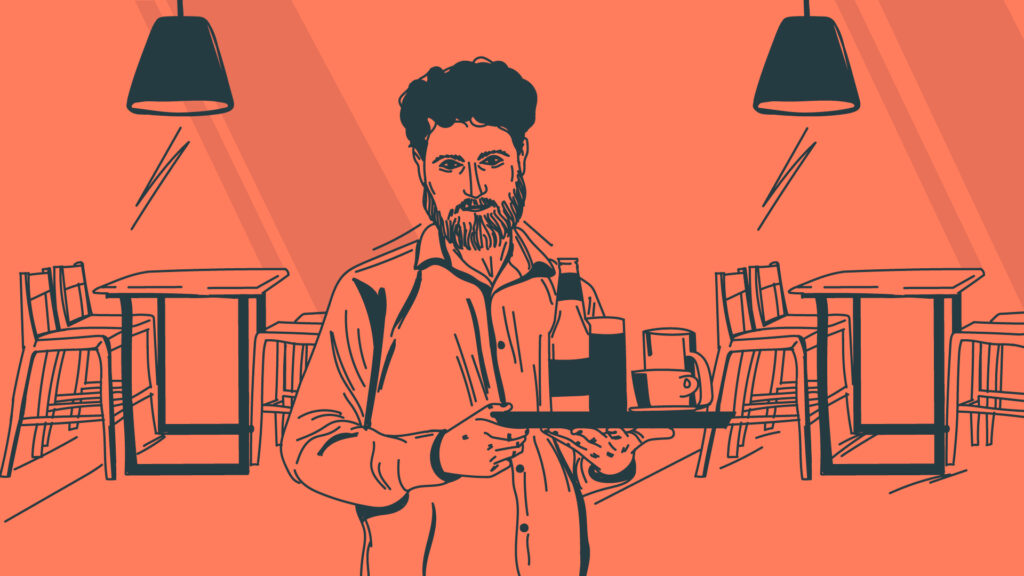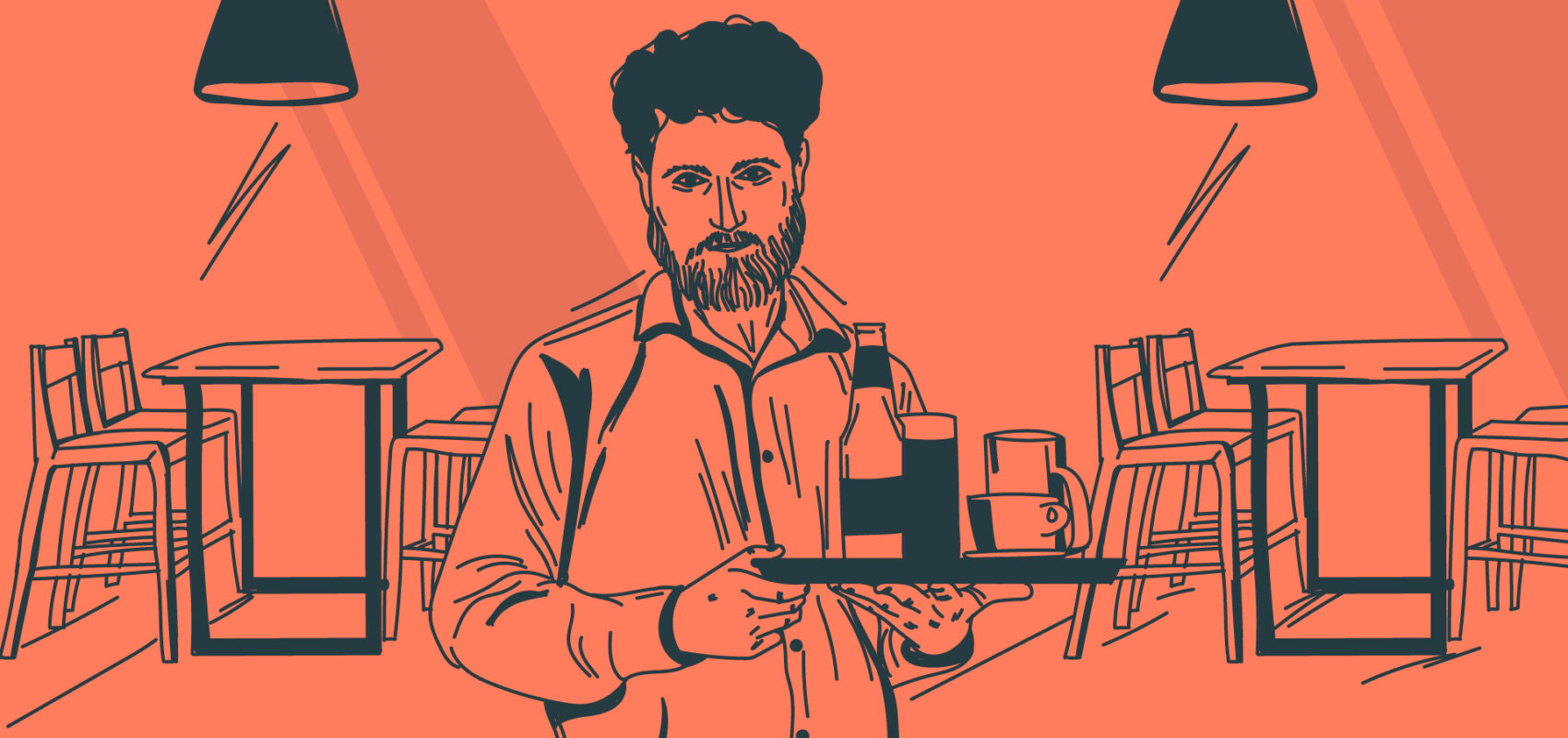The three friends found themselves in a dilemma. Their daily lives had become closely intertwined with the coffee shop located just below their office. Breakfast often began with a cup of coffee there, and lunch was a regular occurrence. The familiarity of the environment seemed to seep into their subconscious, as even work meetings with casual acquaintances were scheduled there. The hustle and bustle of customers and passers-by drew them in, and their friends’ ambitions began to transform this routine into a potential business opportunity. The prime location of the coffee shop only reinforced this idea.
For over a month, the coffee shop would also become my daily routine—not as a client, but as a waiter.
The café is nestled in the shadow of the colossal Post and Telecom of Kosovo building in the Dardania neighborhood of Pristina. With hundreds of well-paid employees and daily traffic from citizens seeking services, the area is a bustling hub. The café is surrounded on three sides by residential buildings housing thousands of inhabitants. The two-story establishment, each floor spanning over 170 square meters, is thoughtfully organized with three columns dividing the space, allowing easy access and interaction between tables. The floors are connected by a staircase made of glass, wood, and steel, positioned near the end of the bar, almost adjacent to the counter. Behind the bar lies a kitchen of about 40-50 square meters, with a narrow office beside it. On the right side of the bar are two restrooms, accessible via a narrow corridor that also leads to an adjoining storage room.
Both floors are bathed in natural light through large windows that adorn the facades. The first floor houses 15 tables surrounded by chairs, while the second floor accommodates a few more. The terrace, shaded by the towering buildings on three sides, is naturally ventilated by the air currents that sweep through the corners of the residential complex. This makes the terrace, with its over 10 tables, an exceptionally cool and comfortable spot during the hot summer days in Pristina.
From a business perspective, the bar’s location, the flow of people passing by, the space, the natural conditions, the state investments in the surrounding infrastructure, and the future potential made the bar an incredibly attractive investment opportunity.
In November 2022, the three friends formalized their ambition by registering the business in their names with a capital of 50,000 euros, equally divided among them. I’m not sure how they managed to convince the previous owners to sell the business, but for the sake of this writing, I’ll refer to the new café as “Coffee with Three Arches,” a playful nod to the three friends.
For at least the last three months of 2023, I was actively searching for a job as a waiter. My goal was to conduct research into the dynamics of the workplace in this role, to observe the interactions between workers and customers, among the café staff, and within the triad of workers, customers, and owners. I had developed the concept for this research long ago and was waiting for the right moment to put it into action. It was becoming increasingly clear that Kosovars would finally be able to travel without a visa through the Schengen Area after a long period of isolation.

No one—be it business owners or workers, media or journalists, politicians or political parties, institutes or experts, organizations or activists, commentators or meme-makers—escaped discussions, analyses, or ridicule on this topic. The debate mainly revolved around the risk that Kosovo might be left without workers. Most people took a mocking tone, viewing the process as a form of revenge—finally, they said, divine intervention was happening for the workers’ benefit. Economists expressed concern about the potential consequences of a labor force exodus, while business owners complained that they had been struggling with a shortage of workers for years. The usual media outlets ran stories like “Businessman offers 500-Euro salary, but no one wants it,” though the salary figures varied. Meanwhile, other news focused on how “Immigrants invest in their homeland” or how life abroad isn’t as easy as it seems.
“When the Association of Gastronomists reacts, it’s as if the Security Council is reacting,” joked one of my friends, commenting on the frequent statements from the association.
Since November-December, I had been looking for a job as a waiter; I wanted to capture the two periods, “before and after liberalization,” preferably in a café in Pristina. Despite the widespread panic and rumors about a mass worker exodus, finding a job wasn’t easy. Social media algorithms helped me find online job postings, and I applied to several. In most cases, I received no response; when I did, the replies were along the lines of, “We’re currently fine with our staff.” I started calling businesses directly, and while some invited me for interviews, the opportunities were not suitable for my research: they had only two employees, and with me, there would be three—small cafés in neighborhoods with limited operating areas and few customers. My research editor insisted that these did not represent a good sample for the study.
Failing in online applications and running out of time, I turned to friends for help. Based on my previous work experiences, I knew that in Kosovo, it’s easier to get a job if someone recommends you; someone knows someone, asks someone who knows someone, or someone knows someone else, and that person can refer you to someone who might hire you. This is particularly true in the gastronomy sector. Some café owners were more skeptical of my work skills than others and told me, “We’re comfortable with our current staff.” They suggested I try other cafés, where “workers are always in demand” and “they have work if you need it.” But this seemed more like a polite way to get rid of me rather than a genuine job offer.
But the year 2024 started with a stroke of luck. Late one night in mid-January, a friend sent me a text.
“Check this out,” she wrote, along with a link to a Facebook post. “He even likes to joke,” she added.
“This also happened,” read the post, which I immediately took a screenshot of. It began with “Hyhyhy” and continued, “Someone came looking for a job at ‘Coffee with Three Arches’”, ending with a laughing emoji.
Curious, I tracked down the author of the post. It was Trimi*, a somewhat well-known figure, though I didn’t know him at the time. I sent him a friend request on Facebook, which he accepted almost immediately. That night, my editor and I discussed the situation and decided to wait and see what the café was like, where it was located, and approximately how many workers it employed—details we could deduce from photos shared on Facebook. We even debated whether I should call him or send a message. The editor advised me to reach out the next day, so I did, but first, I browsed the comments on Trimi’s post, which had garnered over 70 reactions, mostly laughing emojis.
“Did you offer him a job?” was the first comment, which piqued my interest as well.
”Yes, right away,” Trimi replied.
“Did he ask about the salary first,” was another comment. “He asked in the end, that’s the main reason I offered him the job,” Trimi answered, adding an emoji with reddened eyes and cheeks.
The comments on the post were lively, with over 70 likes, mostly laughing, reactions. One comment said that there is a chance that the worker might have been unemployed—a comment I still can’t decipher. A famous singer commented, “I can’t believe it,” accompanied by a laughing emoji with tears streaming down. Another commenter said, “It was just a test to see how you owners will react.” Someone else took the post very seriously, leaving a long comment in two disjointed paragraphs, but I lost interest before reading it to the end.
Another comment implied that the youth in Kosovo is not interested to work.
“They’ve changed a lot for the better,” replied Trimi, laughing along.
Someone else, who seemed fond of Trimi, wrote, “They come to look for work to the good boss. Respect.” Another commenter was in a dilemma, calculating whether to return from Germany to work in Kosovo. But one comment-question caught my attention even more:
“Honestly, tell us how much are you paying them”
“400 + taxes,” Trimi responded.
“I wanted to know,” I texted Trimi, “Are you OK with workers, or do you still need any?”
______________
With a confident tone and a professional approach—similar to a promotional call—he told me that they still needed a worker, either a waiter or a bartender. After some back-and-forth, we agreed to meet the next day for coffee around 4 in the afternoon. When I arrived, he directed me to speak with Besmir*, his business partner, but Besmir wasn’t there either. The bartender, Erona*, who had been told to tell me that “he’ll be here soon” suggested I sit and wait at a table near the counter.
He walked in and came straight to me. We got comfortable and started with some small talk, but the conversation quickly turned to the café. He mentioned that they really enjoyed the café business, and that all the partners were happy and content with their jobs and money—he had two jobs, in fact. He explained that they kept the café “just to cover their own expenses.” Friends and colleagues often came by to eat, drink coffee, and even hold work meetings for their organization. The idea was that since his daily life was already so connected to the café, they encouraged him to try his hand at running it as a business. However, he was careful to emphasize the potential of the café and said, “Here, we work as friends; there are no bosses and workers. I treat everyone as equals; it’s a family-run business.” He added, “we all earn as much as we work.”
“You can start tomorrow,” he said, wanting to know if I was interested in working as a bartender or a waiter. I told him I couldn’t start until Monday, January 22, as I was in the process of moving. He agreed and told me to talk to Kushtrim*, the other business partner, about the contract and salary, but he mentioned that the first five days would be a trial period.
______________
On January 22, 2024, at 10 a.m., I started working as an undercover waiter.
From the first day, I was in a big dilemma—could I do it? The last time I had worked as a waiter was over nine years ago, so I knew what to expect. The night before, I was so anxious about returning to my old job that I had trouble sleeping. “Am I still good at this?” I wondered all night, and by morning, I was sleep-deprived. After an hour of bus drive, and over 30 minutes of brisk walking—since I’m always late—I arrived just before 10 a.m. at the Three Arches Café.
That day was the first time I met Danny*. A well-groomed guy from Gjakova, Danny was about 10-15 centimeters taller, 20 kilograms heavier, and nearly 10 years younger than me. He wore a white shirt with a café logo over the heart, tucked into neatly pressed jeans, and sparkling sneakers in a bright orange color that caught my eye. His cologne was noticeable from the first breath near him, and he was all smiles, looking well-rested despite starting work at 7 a.m. Danny was the waiter with whom I would share the work schedule, and I ended up chatting with him the most over the next month.
Erona* worked at the bar. I recognized her from the day I met Besmir. That day, I started work a few minutes before 10 a.m. Danny advised me, “You cover it downstairs; upstairs there is more people as smoking is allowed. Until you get used to it,” and then began explaining the computer program where the orders are recorded. He was frequently interrupted by customers heading up to the second floor.
Erona told me, “Don’t worry, I’ll help you” but she didn’t have much time to chat because Danny’s orders for coffee and other drinks started coming in one by one.
That day, it seemed to me that lunch started earlier than usual.
I first served a few coffees and some teas on the first floor, and the first hour of work didn’t seem too difficult. It seemed I hadn’t forgotten the old trade, and most customers preferred to head to the second floor, where smoking was allowed. A set of The Weeknd’s songs was playing. The second floor quickly filled with guests. However, around 11:30, everything changed. The first floor began to fill up with people, and aside from the usual greetings, requests for the food menu started to dominate. Here and there, someone would ask for tea or coffee, and I quickly dismissed requests for smoking with a curt “No smoking, except upstairs [on the second floor].” I didn’t pay much attention to the rest of the conversation.
When the first dishes came out of the kitchen, I started to get flustered. The guests weren’t used to being served one by one—if there were three or four people at a table, they expected everything at once: bread, main courses, sides. It was impossible for me to carry everything at once. I tried to compensate for my lack of experience by being almost excessively polite—chances are I said “hello,” “goodbye,” or “thank you” a thousand times that day. I made sure to serve the drinks quickly and accurately, and many customers seemed to understand, with several asking, “Today’s your first day, right?”, “Good luck!” or “Hang in there.”
I was sweating profusely, and Erona was trying to help me with the computer program. Danny also stepped in from time to time to help with serving dishes, reassuring me, “Don’t worry about it, colleague.”
During lunch, another table began to catch my attention. Along with special requests for food—serving water in different glasses without ice, and various other demands—I noticed that one of the customers was constantly watching me. It was also then that I had my first encounter with Kushtrim*, the other business partner, with whom I would sit down after 6 p.m. to discuss my salary, working hours, and other conditions of the job.
(The cycle of publications follows.)
Some of the names used in the article have been changed.
Photos: Ferdi Limani
Illustrations: Arrita Katona
Translated by Arian Lumezi
This story was originally written in Albanian.
About the author

Ngadhnjim Avdyli studied journalism at the University of Pristina. He mainly writes about politics, governance and social justice. He has worked as a journalist for some of the most popular and serious platforms in the country.
This publication is supported by the European Endowment for Democracy (EED)![]()
The views expressed in the article do not necessarily represent the views of the donor.


